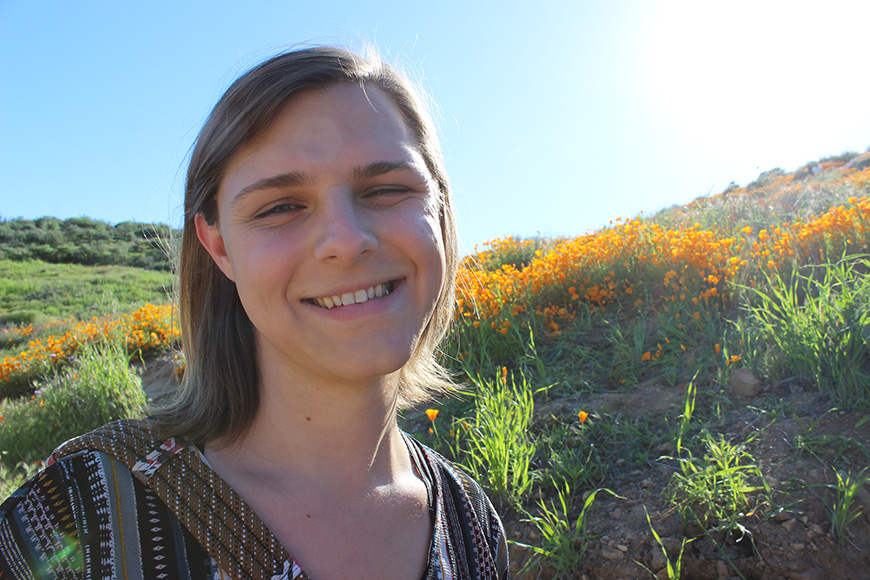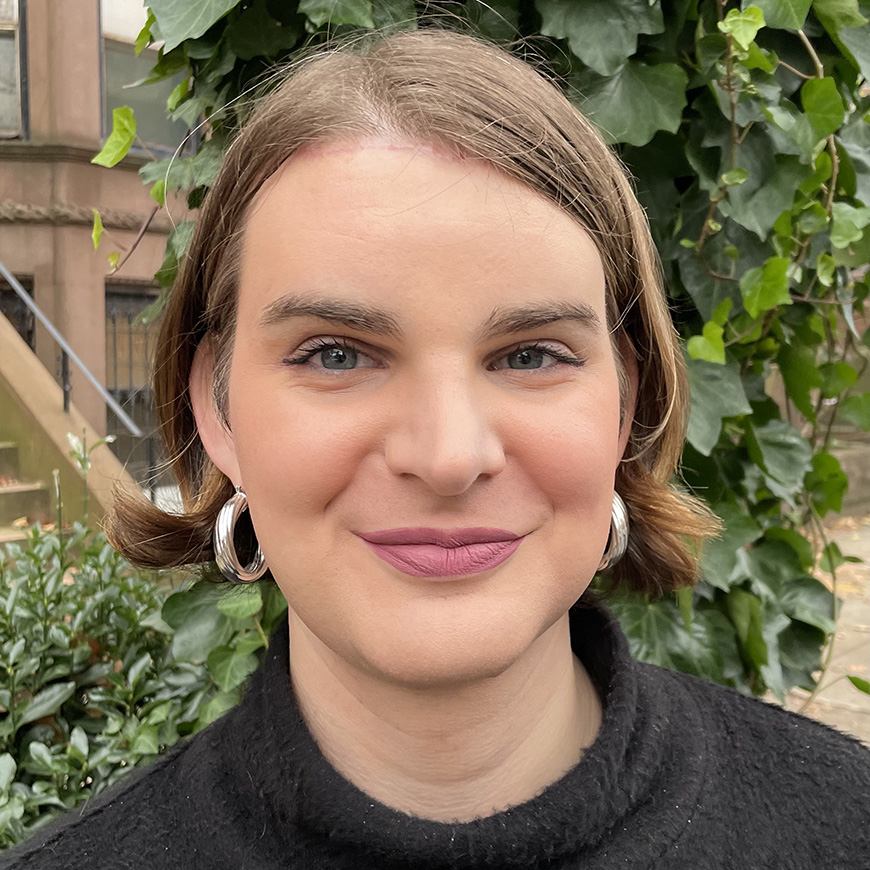
 back to all news
back to all news
Women's History Month: Voices of Alumnae

In our celebration of Women’s History Month, we honor the contributions of all of the remarkable women in our SEAS community. In this segment, we hear the voices of two LGBTQIA+ alumnae. We are grateful to Kate Freeman and Samantha Sikanas for sharing their experiences and perspectives.
We invite you to explore more of our series, Women’s History Month: Perspectives from SEAS Women in Sustainability. We'll be adding more "Voices" and stories throughout the month.
- Voices of Faculty
- Voices of Master’s Students
- Voices of PitE Students
- Nancy Arkin MLA: Open to Opportunities
- Professor Joan Nassauer: Much remains to be done
- A Snapshot of Women Faculty, 1972/2022

Kate Freeman
Financial Analyst, Utility Sector, Edison International
Southern California
BA '13 | MS '16
Kate Freeman is a financial analyst working in the utility sector at Edison International in Southern California. A native "Michigoose," she is an alumna of the University of Michigan, completing her BA in Economics in 2013 before returning to earn her MS in Sustainability from the School of Natural Resources and Environment in 2016. She has previously worked in energy sector consulting at PA Consulting and in business development at TE Connectivity. In her free time, she enjoys playing hockey, board games, rock climbing, and reading punishingly intricate fantasy novels. She currently lives in Los Angeles with her girlfriend Erin, their two herding dogs, and entirely too many house plants.
You made history as the first openly transgender contestant to win on Jeopardy! Can you talk about that experience? I understand that you were a regular at bar trivia night at the Blue Leprechaun in Ann Arbor. Did you have your sights set on becoming a Jeopardy! contestant back then?
Absolutely! I had been aspiring to make it on Jeopardy! since I was a (rather nerdy) kid. I was a contestant in high school quiz-style competitions such as the Michigan Envirothon and the National Ocean Sciences Bowl (which was actually my first introduction to the Dana Building), and I kept up a steady hobby playing trivia games. In grad school, we had a pretty regular team of SNREds that would meet up at Blue Lep for trivia night - definitely a fun way to geek out together with my friends.
Appearing on Jeopardy! was like a nerve-wracking dream come true. The game is really fast-paced, and it's very much a buzzer game (as all three contestants typically know the correct response to any given clue). I faced off against some really tough competitors, and pulling out the win in my debut match (the last filmed that day at the studio) left me to enjoy a state of ecstatic disbelief for the rest of the day. As we were filming under strict COVID-19 safety protocols, we contestants weren't able to socialize as much as is normal, but the staff was very friendly and did a great job keeping our energy up. I was really honored to have the opportunity to meet Alex Trebek and chat with him a bit about hockey - it was one of his last days of filming the show before he passed last fall.
I also had the surreal experience of garnering some viral fame following my appearance on the show, as a surprising amount of news outlets and magazines picked up my story (without consulting or informing me). The highlight was when Autostraddle dubbed me "Queen of the Lesbian Nerds" - which I now demand to be addressed as in formal settings.
You came out as a trans woman before you graduated from SNRE/SEAS. Why was that important for you to do—and after coming out, did you feel supported in the SEAS community?
I finally figured myself out in the summer before my last year at SNRE, and it felt amazing to feel positive about myself and my identity after years of repression. I felt like I was *glowing and immediately began having a really hard time keeping the news private. I knew the SNRE/SEAS community would be supportive of me, and they absolutely delivered - I still have a saved folder of congratulatory and encouraging emails I received from faculty and classmates when I broke the news. The staff were really helpful in helping me draft a coming out announcement to the program at the start of my last semester, and also put out a companion statement of support. It meant so much to me to live authentically in my last semester in the program and it felt really, really good to receive an SNRE diploma with my real name on it.
Have you, as a trans woman, encountered any gender-related barriers in your professional experience in corporate finance? Or do you feel that the culture is (finally) evolving to be more inclusive?
I've been *extremely* fortunate to not have encountered any major obstacles or issues in my professional life as a result of being an out trans woman. My first employer out of grad school actually only had a week's notice before my start date that I had changed my name and gender presentation, and they adapted quickly and flawlessly. I think many white-collar employers across the country are taking steps to more explicitly support and recruit women and LGBTQIA+ employees (although they often have a long way yet to go), and I've been pleasantly surprised to encounter gender near-parity in the utility sector after working in pretty male-dominated settings previously. I have still occasionally had to deal with the sort of low-grade misogyny that women encounter at work, frustratingly - male teammates talking over me in meetings, or assuming I was less knowledgeable or competent.
Do you have any advice for students considering a career in the sustainability fields? If so, do you have any specific advice for LGBTQAI+ students?
It is really hard to be an agent of change in large organizations, but there will always be people alongside you who are heartened by your efforts and supportive of your mission: Going to bat for the things we believe in…

Samantha (Sami) Sikanas
Intermediate Landscape Architectural Designer, Marvel
New York City
BA '11, PitE | MLA '15
Sami Sikanas is an Intermediate Landscape Architectural Designer at Marvel, located in New York City. She graduated from SNRE in 2011 with a BA from Program in the Environment (PitE), and in 2015 with an MLA. After graduate school, she transplanted to NYC where she has been working at design firms including Future Green Studio and W Architecture and Landscape before joining Marvel’s team this spring. Over the 6 years of her career since graduating from SNRE, she has contributed to various urban landscape projects, including a neighborhood master plan in Detroit, NYC Parks projects and waterfronts, and multiple plazas across the city’s boroughs. She was also recently awarded a grant through the Architectural League of New York from the State of New York Council on the Arts for her research project “Queer Landscapes,” which will also occupy her free time this year.
I'm curious about the session you co-led for the American Society of Landscape Architects on "Queer Urbanism Design Guidelines." Can you tell me about that—and what perspectives LGBTQIA+ folks bring to urban design that may be presently lacking in the conversation?
My team’s presentation idea came from an organic conversation between friends, Emilio Martinez Poppe, Addison Vawters, and myself. We come from different backgrounds, art and organizing, planning and housing, and landscape design respectively, and we all found that our identities as queer people informed our work. We chose to discuss two NYC case studies from each of our perspectives and then garner Queer Urbanism Design Guidelines from them. We followed the approach that others before us have used, like the Black Space Manifesto. I think what we have in common with efforts like those is that we are beginning to define how our identities inform design, specifically in the urban public space realm. In turn, we contribute to our communities in an equitable way—at least, that’s the goal.
As a graduate student, did you feel supported by the SEAS/SNRE community?
I was in school before I transitioned, so I didn’t identify as a trans woman then. I’m honestly not sure what my experience would have been had I transitioned before attending graduate school. At the time, there were a few queer students in the MLA program, but all of them were cisgender (as far as I knew). I did find community within the school at large as a queer person. We started a student organization called SNREdOut—I hope it still exists. [Editor's note: The current student LGBTQIA+ org is Out@SEAS]
Have you, as a trans woman, encountered any gender-related barriers in your professional experience as a landscape architect? Or has the culture (finally) evolved?
I have most definitely encountered barriers as a trans woman in the field. One example that comes to mind is being asked about balancing my transition with my work, during an interview. I thought to myself, would you ask a new mother how she would balance her family with work? Absolutely not. Needless to say, I didn’t get the job. Nor did I want it in the end. On the other hand, I recently started a new position at a competitor firm and they have been fully supportive of my gender. There has been undeniable progress in our field, and the world in general. However, it’s always present in my mind that, in the very recent past, trans women were not offered opportunities like these, and that so much more has to be done to be fully supported in our fields.
Do you have any advice for students considering a career in landscape architecture? If so, any specific advice for LGBTQAI+ students?
I am so thankful that I chose this career path. I couldn’t imagine doing anything else besides landscape architecture. It’s the perfect combination of design, science, and social systems. Every day is different from the next. And our work is physically manifested in front of our eyes once our projects are finally constructed. There’s nothing more rewarding than seeing people use a space you’ve helped design and enjoy it.
My advice for prospective students would be to make the most of any program you choose—classes are just a small part of being at the University of Michigan. Soak it all in and put your own spin on it. The best advice I ever got during graduate school, and maybe ever, was from the late Professor Beth Diamond, who was also queer. She told me early on in the first semester of the program: “If you’re going to do it, really do it.” I’ve carried her words with me into my career and into my life. I apply the same logic to my transition, living life as my most authentic self. Her advice has also pushed me to keep pursuing my personal research project “Queer Landscapes,” which just won a grant from the State of New York Council on the Arts. My specific advice to queer people would be the same.

